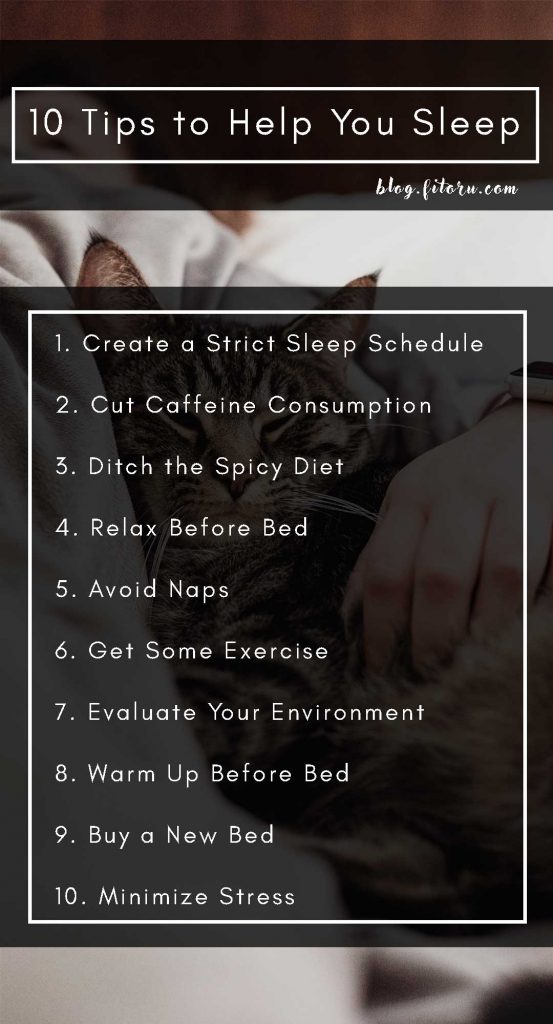Mon - Fri 9.00 - 17.00
Call us +1 (888) 825-9321

When was the last time you got a good night’s sleep? According to one study, only 30% of people in the U.S. describe their sleep as “very good” or “excellent.” Moreover, the Centers for Disease Control report that as many as 70 million Americans don’t get enough sleep.
With lack of sleep resulting in numerous symptoms, ranging from obesity to poor judgment, it’s no secret that many of us are looking for ways to get more rest. However, improving the sleep habits we’ve practiced our whole lives is often easier said than done. Here are 10 tips to help you sleep at night and improve overall health, according to the experts.

Having trouble falling asleep at night? The problem might be that you don’t have a consistent sleeping schedule. If you have a tendency to go to bed at different times every night, you might struggle to fall asleep or stay asleep throughout the night. By setting a clear schedule, you can help reset your body’s internal clock and improve both the quantity and quality of the rest you’re getting.
Drinking too much coffee before bed can have a negative effect on your sleep schedule. Additionally, individuals who drink tea, soda, or energy drinks late at night are likely to suffer sleep disruptions. For best results, switch out the caffeinated beverages for herbal teas and water.
Spicy and acidic foods have a habit of causing heartburn, which can keep people up at night. If you want to reduce heartburn and reflux, avoid eating these types of foods close to bed. Additionally, insomniacs may want to avoid alcohol. While nightcaps might seem harmless, the truth is they can actually cause you to wake up later in the night.
If you’re having trouble drifting off into dreamland, you might want to consider adopting a more regular bedtime routine. Taking part in the same behaviors before bed can help tell your body it’s time to rest. For best results, get a comfortable mattress and avoid activities that cause stress or excitement and refrain from using phones and other brightly lit devices before bed.
An afternoon nap might sound like fun, but the truth is it can affect your ability to fall asleep later that night. While there’s usually nothing wrong with taking a quick power nap, it’s best to avoid sleeping for an hour or so in the afternoon.
Exercise doesn’t just help you lose weight and stay healthy; it can also ensure you sleep well at night. While it’s best to engage in vigorous cardiovascular activity three or four times a week, even going for a quick walk can help you get more rest.
Redecorating your bedroom might be fun, but it’s probably not enough to help you sleep better. If you want to improve the quality and quantity of sleep you’re getting, you have to look at the environment as a whole. For example, most people sleep best in rooms cooled to between 60 and 67 degrees. Additionally, you should eliminate noises (such as TV sounds or music) and turn off any lights near the bed. Finally, patients with insomnia may want to consider using ear plugs, eye shades, blackout curtains, and fans or white noise at night.
While people tend to sleep better in cool rooms, warming up before bed can have a positive effect on the body. Consider taking a hot shower an hour or so before hitting the sack. The switch from warm to cold can cause your body temperature to drop more quickly, thereby slowing your metabolism and preparing you for sleep.
How long have you been sleeping on your current mattress? According to the National Sleep Foundation, most high-quality mattresses have a life expectancy of just 10 years, so consider replacing your bed if it’s been around much longer. You can also improve sleep by purchasing more comfortable pillows and avoiding fabrics known to aggravate allergies.
Stress has a negative effect on both body and mind, so it’s no surprise that chronic worriers often struggle with insomnia. If stress is keeping you up at night or impacting your ability to stay asleep, consider meditation, journaling, or another tactic for resolving concerns prior to hitting the sack.

Studies show that lack of sleep can increase a patient’s risk of developing diabetes, hypertension, and even cardiovascular disease. By taking steps to improve your sleep, you might just be able to improve your overall health in the coming years.